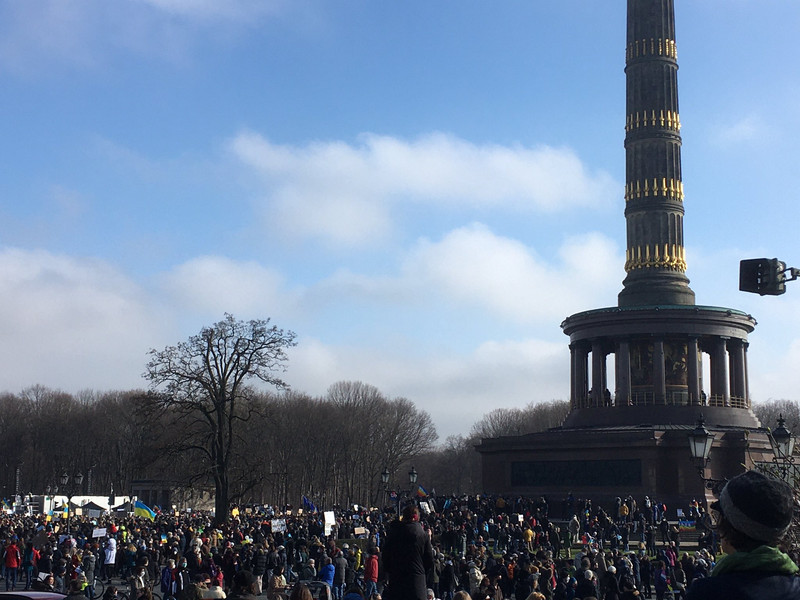Vladimir Putin’s tanks are firing at kids. Huge numbers of people are on the move.
Filip, a supporter of WeMove Europe in Poland, who has taken Ukrainian refugees into his own home, wrote to say that the current relief effort is largely an initiative of people.
-
Polish volunteers staffing a crisis and reception centre for Ukrainian refugees in Rzeszów on Tuesday night (Photo: Andrew Rettman)
He feels abandoned by his government and the EU. And while there is some help, the disproportion of the burden is huge.
By this week, two million people had fled Ukraine. Some 1.2 million arrived in Poland, 190,000 in Hungary, 140,000 in Slovakia, 80,000 in Moldova, 80,000 in Romania and 210,000 in other EU countries. About 80,000 people are entering Poland daily, according to the UNHCR.
That’s the population of my hometown Galway, every single day.
Volunteers and civil society organisations are working under constant strain to help refugees resettle.
Down the road in Berlin, 6,000 people arrived at Hauptbahnhof on one day, last Thursday (3 March). They too are mostly being supported by volunteers.
But it is European member states that need to take the responsibility for this crisis. And they can start by implementing the Temporary Protection Directive — for everyone.
Last week, 92,000 Europeans signed the WeMove Europe petition demanding this legal step, so that millions on the move have hope of a temporary visa, regardless of the colour of their skin or passport.
By Thursday it was there: a directive designed for, but dormant since, the Yugoslav wars would be invoked for the first time ever. It’s being described as revolutionary, and it could be — but only if it’s applied to all.
Therein lies the catch. The directive does not apply to all people.
Last Saturday Andreea, an activist and supporter of WeMove Europe in Romania, told us of the heartbreaking stories she’s surrounded by, including that of a Syrian student who’s now fleeing a second war. He’s not eligible for protection under the directive. Nor are temporary workers or people without a permanent status in Ukraine.
These are the very people who could really use support and protection.
In Poland, information points assist only Ukrainian passport holders. Transport is provided only to Ukrainians to go from the border to registration points. City transport is offered to Ukrainians. All others are fined for using public transport without a ticket, according to the Polish Migration Forum.
If the most enlightened societies are the ones that take care of the most vulnerable first, Europe isn’t looking so hot right now.
All of this says nothing of the people already freezing on the border of Belarus and Poland.
There is still so little information available about their situation. What we know is that since the beginning of February, Polish NGOs have received emergency phone calls asking for help for 245 people, including 16 children.
To quote my Polish colleague, “in the autumn, one group of children were left to die on the border because their entrance would violate the principle of Polish sovereignty. A wall would keep them out. By spring another group was welcome and would never be left alone.”
Meanwhile on the Greek Turkish border, 12 migrants were found frozen to death in February, allegedly pushed back over the frontier by Greek guards. This wouldn’t be a first for Greece.
It’s time for something different. The first step is to implement the Temporary Protection Directive for all and then to take a hard look at Europe’s system to distribute the protection burden, which needs to function for all people.
A couple of member states have taken action.
Belgium has published its national implementation steps, informing Ukrainian residents and citizens how they can register and get papers. Poland has also adopted a special act to provide residency and resources for some people — but not third-country nationals.
But what about the rest of the EU? Every EU country has the responsibility to protect those fleeing a dictator Europe has bankrolled for years with payments for his oil and gas. Every EU country has a responsibility to protect people on the move no matter whether the reason for their displacement is a dictator, a flood or destitution.
Already so much is changing, including big changes of heart. Governments are making decisions that sounded radical two weeks ago.
There is space now to reconsider what has been fuelling our crises — and to respond to the effects of those crises more effectively.
Come on Europe, we’ve got this.
By LAURA SULLIVAN
Source: EU Observer



